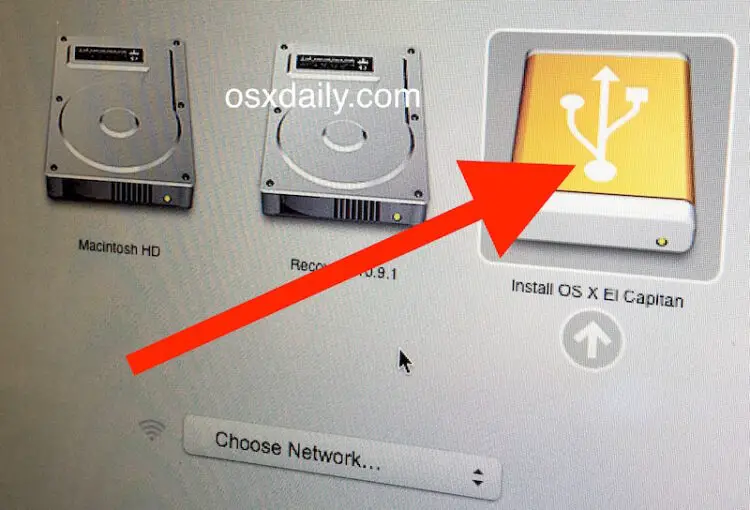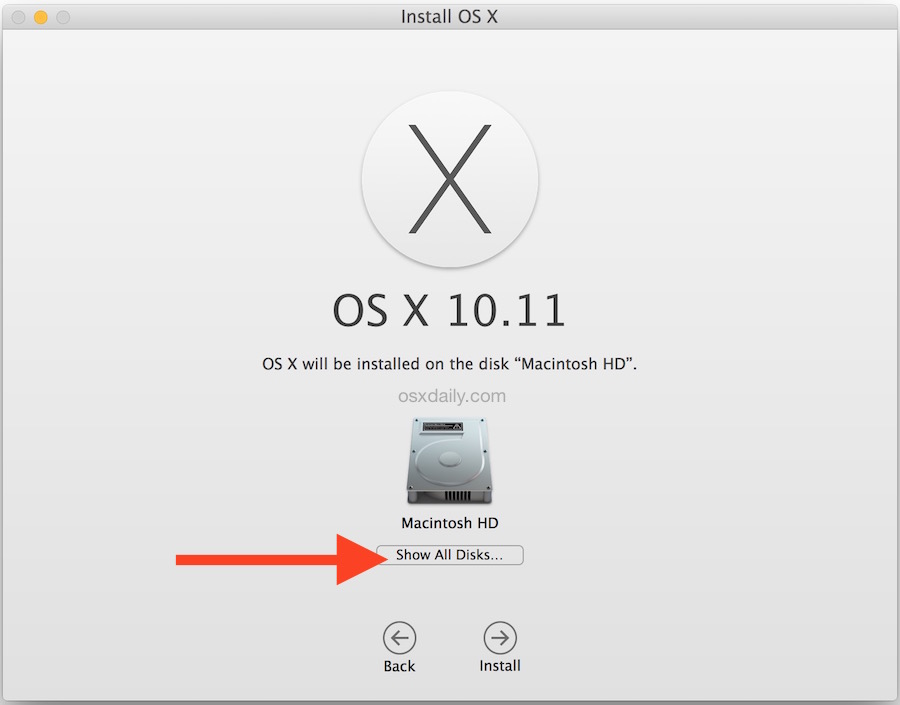- Recovery Install Os El Capitan
- Install Os El Capitan From Usb
- Free El Capitan Download
- El Capitan Os X Download
Download El Capitan
Dec 22, 2020 Follow the onscreen instructions, which will guide you through the steps necessary to install. Begin installation. After installation of the installer is complete, open the Applications folder on your Mac, then double-click the file named Install OS X El Capitan. Well, read on to learn how you can install Mac OS X El Capitan on PC without a Mac, using VirtualBox. VirtualBox is a virtualization software that enables an operating system to run as a program or application. VirtualBox allows operating systems to be installed on it, by creating a virtual machine. Feb 24, 2021 This is the Install DMG of OS X El Capitan, downloaded from Apple's website just before this upload. This is for archiving purposes, just in case Apple decides to remove the download, so people can still download this in the future. 2021-02-24 22:39:21. Internet Archive HTML5 Uploader 1.6.4. Download El Capitan. This will explain another way to install El Capitan to your device using external images file. DMG is a mountable disk image created for all Mac OS X versions and used to.
Download El Capitan OS X is also significant since it’s the last version of Apple Mac OS X released as its successor Sierra was released in the year 2016 under the brand macOS.
El Capitan latest version
El Capitan 10.11.6 is now released as the latest version of Download El Capitan . For OS X El Capitan users this update is recommended. The upgrade to OS X El Capitan v10.11.6 enhances your Mac's reliability, performance and protection and is advised for all users. Solves a problem that can prevent parental control accounts from saving settings. El Capitan Download latest version solves an issue, which prevents access to SMB sharing points by some network devices, such as speakers and multifunction printers. It improves startup time for the NetBoot server connection. Solves a problem that can make authentication of Active Directory longer than anticipated.
At the time of release, El Capitan was promoted as a significant release by Apple similar to how they promoted Mavericks and Yosemite upgrades which were the predecessors of El Capitan.
OS X 10.11 El Capitán
This update is recommended for all OS X El Capitan users.
The OS X El Capitan v10.11.6 update improves the stability, compatibility and security of your Mac and is recommended for all users.
This update:
- Fixes an issue that prevents parental controls from saving settings in enabled accounts.
- Fixes an issue that prevents some network devices, such as speakers and multifunction printers, from accessing SMB partitions.
Enterprise Content:
- Improves boot time when connected to a NetBoot server.
- Fixes an issue with a netboot image created with OS X v10.11.4 or OS X v10.11.5 installer preventing it from booting.
- Active directory authentication fixes an issue that may take longer than expected.
System and Hardware Requirements for Download El Capitan
- System requirements : You should have OS X v10.6.8 or below version and 2GB memory. And should have 8.8 GB of capacity. Apple ID is required for certain features; terms are applicable. Certain features include an Internet service provider that is compatible; fees can apply.
- Hardware requirements : MacBook (early 2015)/ MacBook (late 2008 Aluminum or early 2009 or newer)/ MacBook Pro (Mid or late 2007 or newer)/ MacBook Air (late 2008 or newer)/ Mac mini (early 2009 or newer)/ iMac (mid 2007 or newer)/ Mac Pro (early 2008 or newer)/ Xserve (early 2009).
Features of OS X 10.11 Download

- Safari has new features in the El Capitan update. It allows you to easily pin the tabs in the browser to the tab bar so that you can easily access them in the next time
- It has multi-touch gestures to applications like Mail and Messages. And it uses the gathered information of the individual emails on the apps like Calendar
- The Maps feature in the OS X 10.11 offers you the information about public transportation
- Notes feature has added more powerful text processing capabilities. Under this improvement, you can add to-do-lists just like the Reminders application, map locations, photos and videos, inline webpage previews, digital sketches, and other media types
- The Spotlight feature is more improved with more contextual information
- The Photos feature in the El Capitan can now use editing tools from other apps
- The System Integrity Protection gives you more protection to the OS X El Capitan running Mac computers and laptops
Installing Homebrew on Mac OS X prior to El Capitan (that is Yosemite, Mavericks and others) used to be a breeze. But with a new change in OS X El Capitan called SIP - installing Homebrew has become a bit complicated.
You need not worry, I have got you covered.
There are two parts to this tutorial. If you want to uninstall or delete Homebrew first and then re-install it on El Capitan then follow Part 2 of this tutorial below. However, if you are doing a fresh installation of El Capitan then follow the steps outlined in Part 1 of this tutorial.
Happy Brewing!
Part 1: How to install fresh copy of Homebrew in OS X El Capitan
Step 1 - Install XCode by downloading it from here. This is needed for installing the XCode command line tools which in turn is needed by Homebrew. You might skip this step if you already have XCode installed.
Quick Note - If you already have XCode installed then go to STep 2. Also, You can skip this step and jump to Step 3 instead and see if the Homebrew installer complains about XCode command line tools. If it does, then come back to this step and continue.
Step 2 - Install Command Line tools by running the following command in terminal:
Step 3 - Now, you need to get a fresh copy of Homebrew and then run the install script. You can perform both these tasks using this one command in the terminal app:
If it complains about permission issues, then you have to fix it before you can continue. This is an additional thing that you need to do in Mac OS X El Capitan because Apple introduced this new feature called System Integrity Protector. Here is a guide to how you can fix this permission issue with Homebrew on OS X El Capitan.
After you have fixed the permission issue, re-run the command above in the terminal to begin the Homebrew installation process.
Step 4 - Run the Brew Doctor utility to check for issues or warnings in the terminal
brew doctor
If it shows errors, then you need to fix them before you can continue. You might, however, skip any warnings that the doctor tool shows.
All the apps and libraries that you install using Homebrew are located in this folder: /usr/local/Cellar
After Homebrew is installed, you can use some of the following commands to perform different tasks with it:
- You can search for an application using: brew search
- You can install a new application using: brew install <application-name>
- In order to list all apps installed by Homebrew, you can use: brew list
- For removing an app installed via Homebrew: brew remove <application-name>
- Homebrew can be updated using: brew update
- man brew will show other switches and command options for Homebrew.
Part 2: How to uninstall and re-install Homebrew in OS X El Capitan
Step 1 - First you will have to delete the Cellar folder of Homebrew that is usually available in the /usr/local folder. To do this, you need to run the following command in the terminal:
rm -rf /usr/local/Cellar /usr/local/.git && brew cleanup

Please note - If the above command throws a permissions error then you need to read this article to fix the Homebrew permissions in OS X El Capitan.
Step 2 - Install Xcode & XCode command line tools. This is an optional step but for many users, installing the tools mentioned in this step is mandatory. So in order to check, if you have to really perform this step, what you can do is quickly skip to Step 3 and run the command mentioned on that step - if you see success then you can safely skip this step, else continue here:
First download and install Xcode from this link - https://itunes.apple.com/au/app/xcode/id497799835?mt=12
Next, install Xcode command line tools by running the following command in your terminal:
Recovery Install Os El Capitan
If it complains about permissions, then use sudo and run the same command again.
Install Os El Capitan From Usb
Step 3 - Now that you have a cleaned-up Brew data folder, you need to fetch a fresh copy of Homebrew and start the installation process by running this command in the terminal:
You might be prompted for your root password and when that happens, enter the password and continue. You can find some sample output towards the end of this post.
Step 4 - After the installation completes, you should run the doctor utility on brew to see if there were any issues with the Homebrew installation. This can be done by running the following command:
brew doctor
If it returns any error, try fixing them. If you see just warnings then you could ignore them.
At this point you have succesfully installed Homebrew on El Capitan and you can use the commands mentioned above to perform various operations.
Free El Capitan Download

El Capitan Os X Download
Some sample Outputs:
?>